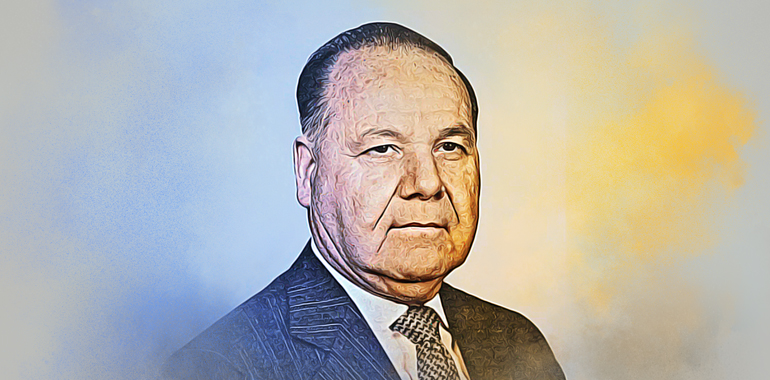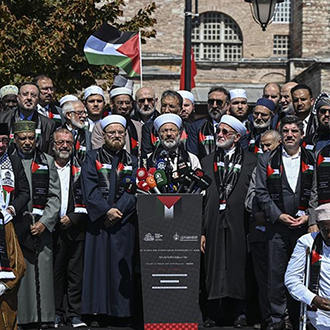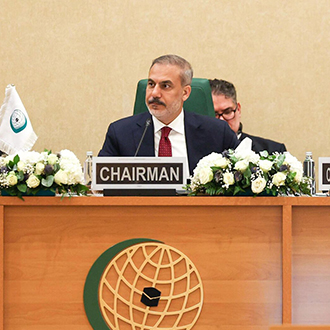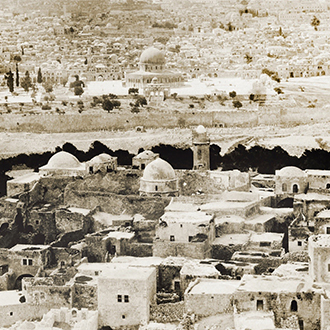These institutions served not only to fulfill the sense of belonging of Muslims residing in the West but also to offer a prescription of ideas for all Muslims against the hardships engendered by the twentieth century through their scientific and intellectual endeavors.
He resided in the United States while continuing his scholarly activities. Despite this, a part of him was always in touch with the Muslim world. He maintained contact with Islamic research institutions in Pakistan, India, South Africa, Malaysia, Libya, Saudi Arabia, and Egypt, contributing significantly to their projects, implementation, and consultancy efforts.
Ismaʻil Raji al-Faruqi and his wife, Lois Lamya, were murdered in their home in Wyncote, Pennsylvania, on May 27, 1986, in a knife attack during sahur time. The incident caused widespread repercussions in the Muslim world.
Ideas expressed by Faruqi
Ismaʻil Raji al-Faruqi was a highly esteemed intellectual figure in the Muslim world in the twentieth century. He engaged in diverse fields of study and developed his own ideas based on years of research. His expertise spanned across various disciplines, including comparative history of religions, art, history of thought, political philosophy, Western philosophy and theology, moral metaphysics, epistemology, and ontology.
However, his central concern in all these areas was the position that Muslims ought to adopt in a modern world shaped by a new era.
According to Faruqi, Muslims faced a major dilemma in the second half of the nineteenth century until the twentieth century. They merely imitated the West without attaining any noteworthy successes, which presented a fundamental issue.
In the political atmosphere that emerged arose after the Ottoman Empire’s defeat in the nineteenth century, artificial borders emerged in the Muslim world, resulting in a sense of despair among the ummah, as noted by Faruqi. The establishment of this political foundation by Western imperialist colonizers resulted in the creation of new issues. Foreign interpretations dominated the Muslim mindset through the colonial establishments instituted by the West in Muslim territories. The cultural and intellectual dynamics of the Muslim ummah deteriorated over time, losing their distinctive qualities and becoming unrecognizable. Under the guise of modernization, Western academic institutions were introduced, and English and French were adopted as languages of education. This also affected the mindset of Muslims. Over time, foreign myths infiltrated the consumption and clothing habits, home decor and furnishings, the streets, avenues, and zoning of the cities in which the Muslims lived, their societal organization, and the way in which they spent their leisure time. Due to this infiltration, Muslims gradually deviated from the genuineness of their intellectual identity, to the extent that Muslims, in general, have become chaotic in both their thinking and their lives. This is because, after extensive imitation, Muslims could be neither distinctly Islamic nor Western.
Faruqi’s proposed solution
Faruqi, who identified and diagnosed the conflict in the Muslim world, emphasized proactive steps rather than succumbing to despair. Unlike individuals and groups who only provide political prescriptions for the Muslim world to get back on its feet, he revealed his uniqueness by addressing the issue of mindset, where the defeat began in the first place.
His greatest thesis was the “Islamization of Knowledge” project, which he believed would serve as a remedy for the salvation of the Muslims. But what did this mean and how was it to be realized?
According to Faruqi, there was a need for an educational method and educational institutions that would cultivate a new worldview that reflected the spirit of Islam. This would be of utmost priority since only such a worldview could guarantee the salvation of Muslims. Muslims would not be able to provide unique institutions, produce scientists and politicians, or generate novel economic and social ideas without a worldview that is distinctively their own.
What is the meaning of this Islamic worldview?
By this, Faruqi meant a set of rules produced on the basis of the oneness of Allah, the oneness of reality/truth, the oneness of knowledge, the oneness of humanity, and the oneness of life, based on the inseparability of reason and revelation. This concept constituted the Islamization of knowledge. The roadmap for this endeavor included five fundamental conditions: thoroughly mastering modern disciplines, completely refining Islamic cultural heritage, achieving special compatibility and reconciliation between Islam and every field of modern knowledge, developing methods for a productive synthesis of Islamic cultural heritage and modern knowledge, and placing Islamic thought on a trajectory that would fulfill the divine model and make it operational.
The basic compass of this roadmap was “tawhid”. According to Faruqi, tawhid is the essence of Islamic thought, both as a principle that reconciles knowledge and truth and as a guiding principle for all steps of thought and life. In brief, tawhid represents a worldview. This view is an axis view for Muslim individuals. In other words, for Muslims, metaphysics, science, history, ethics, morality, art, social, political, and economic systems are all areas that should be interpreted based on this principle.
In short, according to Faruqi, with the project of Islamization of knowledge, contemporary ideas would be reshaped, defined, and regulated through the filter of the Islamic worldview. Consequently, the mental framework of Muslim individuals would be restructured according to their unique worldview, thus freeing them from blind imitation and preventing degeneration. The Muslim population could offer its distinct perspective to help solve contemporary issues and regain global prominence, as it did during past centuries.
The greatest proof of this is hidden in the golden ages of Islamic civilization. During these periods, the Muslim world Islamized the scientific heritage of civilizations such as India, Ancient Greece, and Persia, and incorporated them into the Islamic sphere of knowledge and culture, reaching its zenith. Today, by progressing through five stages of modern knowledge and grounding it in tawhid, the contemporary Muslim world has the potential to break free from these chains.









